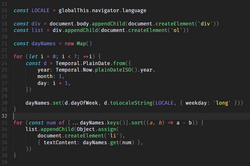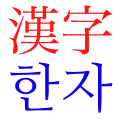The regular script is the newest of the major Chinese script styles, emerging during the Three Kingdoms period c. 230 CE, and stylistically mature by the...
9 KB (911 words) - 09:17, 13 May 2025
shared with the later regular script. Although it was succeeded by the later scripts, including the regular script, the clerical script is preserved as a...
14 KB (1,738 words) - 02:12, 17 July 2025
Chinese characters (redirect from Chinese script)
easier to write. Following the Han, regular script emerged as the result of cursive influence on clerical script, and has been the primary style used...
121 KB (14,155 words) - 23:34, 31 July 2025
variants of the clerical script and the regular script. The cursive script functions primarily as a kind of shorthand script or calligraphic style and is faster...
8 KB (887 words) - 12:49, 24 May 2025
hiragana are used in calligraphy; katakana were derived from the shapes of regular script characters, and hiragana were derived from cursive forms. Following...
12 KB (1,391 words) - 18:04, 16 July 2025
Chinese calligraphy (section Regular script)
Slip script (Chu) Slip script (Qin) Shuowen Small seal script Clerical script Regular script (traditional) Semi-cursive script Cursive script Regular script...
51 KB (5,867 words) - 07:31, 24 July 2025
style. This makes the style easily readable by readers who can read regular script and quickly writable by calligraphers who require ideas to be written...
12 KB (1,442 words) - 09:08, 6 April 2025
Seal script or sigillary script (simplified Chinese: 篆书; traditional Chinese: 篆書; pinyin: Zhuànshū; lit. 'decorative engraving script') is a style of writing...
8 KB (851 words) - 19:46, 21 April 2025
Ming typefaces (redirect from Songti script)
correspond to the Song dynasty when a distinctive printed style of regular script was developed, and the Ming dynasty during which that style developed...
11 KB (1,168 words) - 06:38, 19 May 2025
Hiragana (redirect from Hira (script))
upper part shows the character in the regular script form, the center character in red shows the cursive script form of the character, and the bottom...
52 KB (4,202 words) - 09:42, 26 July 2025
Oracle bone script is the oldest attested form of written Chinese, dating to the late 2nd millennium BC. Inscriptions were made by carving characters into...
32 KB (3,818 words) - 16:07, 14 June 2025
Nüshu (redirect from Women's Script of Jiangyong)
derived from be italic variant forms of regular script Chinese characters, as can be seen in the name of the script, though some have been substantially...
24 KB (2,932 words) - 04:23, 25 May 2025
in various styles, principally seal script, clerical script, regular script, semi-cursive script, and cursive script. Adaptations range from the conservative...
25 KB (2,876 words) - 03:54, 15 July 2025
in 1936 Regular inflection, the formation of derived forms such as plurals in ways that are typical for the language Regular verb Regular script, the newest...
8 KB (1,019 words) - 01:20, 25 May 2025
Kana (redirect from Kana script)
used for their meanings as they are now), or more specifically the regular script (楷書, kaisho) writing of such kanji. It was not until the 18th century...
34 KB (3,309 words) - 13:38, 13 June 2025
JavaScript (/ˈdʒɑːvəskrɪpt/ ), often abbreviated as JS, is a programming language and core technology of the World Wide Web, alongside HTML and CSS. Ninety-nine...
84 KB (7,917 words) - 17:43, 27 June 2025
Katakana (redirect from Kana (script))
Japanese writing system along with hiragana, kanji and in some cases the Latin script (known as rōmaji). The word katakana means "fragmentary kana", as the katakana...
56 KB (4,601 words) - 21:37, 8 July 2025
Python Scripting for Computational Science, p. 320; Programming PHP, p. 106. All the if statements return a TRUE value Conway, Damian (2005). "Regular Expressions...
97 KB (8,871 words) - 08:15, 24 July 2025
Dragons. Regular script (楷書) is usually used in the areas of Hong Kong, Taiwan, Canton, China and Southeast Asia, while Semi-cursive script (行書) is usually...
44 KB (4,656 words) - 16:03, 1 August 2025
Devanagari (redirect from Devanagari script)
based on the ancient Brāhmī script. It is one of the official scripts of India and Nepal. It was developed in, and was in regular use by, the 8th century...
105 KB (7,045 words) - 12:45, 8 June 2025
family. The Nāgarī script was in regular use by 7th century CE, and had fully evolved into Devanagari and Nandinagari scripts by about the end of first millennium...
6 KB (563 words) - 17:29, 23 June 2025
dynasty. This was also the first time regular script was used as all earlier cash coins exclusively used seal script. During the Song dynasty a large number...
135 KB (6,630 words) - 23:02, 21 July 2025
styles Seal script Clerical script Semi-cursive script Cursive script Regular script Regular script is considered the archetypal Chinese writing and...
39 KB (4,729 words) - 13:47, 3 July 2025
Chinese character strokes (category CS1 uses Chinese-language script (zh))
strokes first came into being with the clerical script during the Han dynasty. In the regular script that emerged during the Tang dynasty—the most recent...
85 KB (5,306 words) - 00:57, 23 May 2025
A teaching script is a sample script that serves as a visual orientation for learning to write by hand. In the sense of a guideline or a prototype, it...
33 KB (4,090 words) - 21:23, 19 March 2025
Cyrillic script (/sɪˈrɪlɪk/ sih-RI-lik) is a writing system used for various languages across Eurasia. It is the designated national script in various...
94 KB (5,410 words) - 12:35, 30 July 2025
vertical writing, as is the case for all the ancient Korean literature in regular script, except where Hangul are mentioned and illustrated.[citation needed]...
4 KB (382 words) - 02:22, 8 July 2025
Calligraphy (category CS1 uses Chinese-language script (zh))
was also authorised under Qin Shi Huang. Between clerical script and traditional regular script, there is another transitional type of calligraphic work...
58 KB (6,215 words) - 17:25, 31 July 2025
Hanja (redirect from Hanja script)
records were written primarily in Literary Chinese using Hanja as its primary script. As early as 1446, King Sejong the Great promulgated Hangul (also known...
50 KB (5,808 words) - 21:04, 14 July 2025
comparison of Freestyle Script: Freestyle Script Plain Freestyle Script Plain Bold Freestyle Script Regular Freestyle Script Plain specimen Further samples...
9 KB (920 words) - 09:59, 15 December 2024























